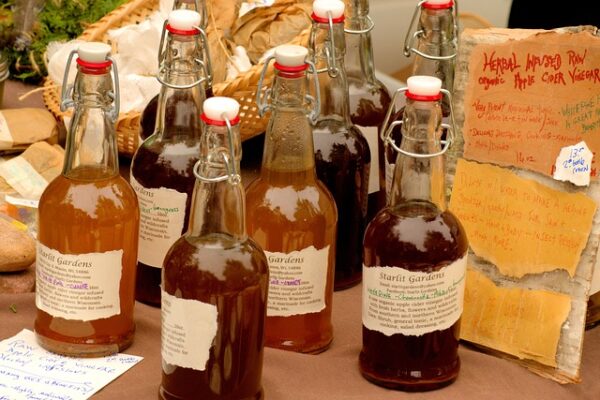Info, news & debate
Food & drink

‘Monbiotic man’ – will future food be ‘farm-free’?
Simon Fairlie starts a series of articles about whether technology will save us. He supports small farmers over George Monbiot’s ‘Regenesis’ solution.

Not so nasty nettle – an honourable compendium for an overlooked plant!
Recipes for the humble nettle. Read how to pick, choose and cook with this overlooked plant.

Fighting our food waste habit
How improving our food waste habit can save us money and reduce our carbon footprint.

New owner sought for low-impact pub and glamping site in rural Suffolk
Aldegarden is a wonderful site in Suffolk, with accommodation, a community pub, and a ‘glamping’ site with yurts, timber structures, a cob roundhouse, gypsy caravan and a converted barn, communal areas, solar hot water and electricity and compost loos. They’ve been in our directory for years. But now they’re looking for new owners for the property and successful businesses.

What is quince and how to cook it
How to cook your homegrown quince!

How To make cider vinegar
To make cider vinegar we need to start with a fully fermented dry cider with a minimum 5% alcohol content. Sulphur dioxide should not have been added for storage, because this will inhibit the conversion to acetic acid.

Why eat raw foods?
A fast synopsis and gentle reminder of the power and necessity of incorporating raw foods in your diet for health and vibrancy…

Consider gifting land to the Ecological Land Coop to support agroecological farming
At Low impact we love to hear about our companion organizations’ successes, this reblog from the ecological land coop describes why we are celebrating. The ecological land coop have been inspired to try a new approach in their campaign to reawaken our rural economies after they were gifted land by two very noble ecologically minded farmers in Wales…

Reflections on building the ‘Commons’ economy
Lowimpact has been around since 2001, and we’ve provided lots of ways to help people live more sustainably. We’re going to also be focusing on how to build the ‘commons’ economy in future, as a viable alternative to the status quo.

How to make wild garlic, nettle and cheese savoury muffins
Here’s a recipe for savoury muffins using wild garlic and nettle tops that can be foraged in many places at this time of year.

How to make good apple juice
Apple juice is in some ways more difficult to make than cider, and indeed it can scarcely be regarded as a traditional product at all. Until the recognition late in the 19th century that fermentation was caused by yeast converting sugar into alcohol, the difference between juice and cider was somewhat obscure and of little practical importance in any case.

Voting with my fork: plant foods I’m not buying any more
Sometimes, I wish I didn’t know the backstory to some foods, so I could happily buy them at the local shops and not think twice. But I do and here is my list of foods I won’t be buying again plus others that will require careful buying choices.

The benefits of sprouts – living superfoods
First let’s be clear. I’m not talking about Brussels sprouts! I’m referring to different types of sprouts. I’m referring to the tiny white shoot (primary root) that emerges when a seed, bean or grain begins to germinate and begins to grow into a vegetable.

Market gardening and working horses: help co-create a new enterprise in Devon
Our network members Ben and Lorraine of Forest Crafts are hoping to find one or two people to help them develop a new business involving market gardening, working horses and working alongside volunteers. It’s a great opportunity for the right person / people.

Building the new economy with mutual credit in Costa Rica
Here’s a conversation with Emmanuel Savard, co-founder of a group in Costa Rica that’s looking at providing all the essentials of life – food production, housing and energy – for their town via regenerative, non-extractive, sustainable, community-based exchange and investment models.

Why we should support small fishing boats over super-trawlers, Part 3
Here’s the third and final part of my interview with Caroline Bennett, founder of ‘Sole of Discretion’ (a community interest company that sells fish caught by a collective of small fishing boats in Devon) about why we should support small fishing boats over giant super-trawlers. We’re talking about how government quotas benefit super-trawlers and disadvantage …

Introducing the Velojuicer – pedal-powered apple scratter
Here is an in-depth look at the Velojuicer, our pedal-powered apple juicer. A lightweight, mobile, all-in-one machine that scrats, presses, and juices apples using only human power and a bit of good humour.

Why we should support small fishing boats over super-trawlers, Part 2
Here’s Part 2 of my interview with Caroline Bennett, founder of ‘Sole of Discretion’, a community interest company that sells fish caught by a collective of small fishing boats in Devon. Here we talk about the life of small fishing boat skippers.

12 reasons why industrial-scale agriculture is driving environmental destruction
In this article, the LWA’s Horticulture Campaigns Coordinator Rebecca Laughton explains why we have to produce and trade a greater percentage of food locally.

Why we should support small fishing boats over super-trawlers, Part 1
Here’s Part 1 of our interview with Caroline Bennett, founder of ‘Sole of Discretion’, a community interest company that sells fish caught by a collective of small fishing boats in Devon. Here we’re talking about the sustainability and community benefits of small fishing boats, the barriers that they face, and how her business can help …
